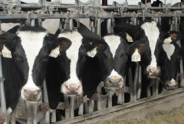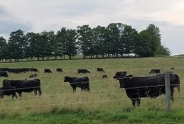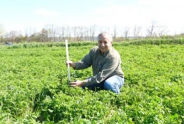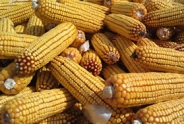Resources
We have compiled a list of useful resources for farmers, consultants and agri-business professionals. We hope that these websites can provide you with additional information and guidance.
GENERAL
Links to Services
FDA Food Safety
NY FarmNet: Hotline : 1-800-547-3276 (24 hr service)
Farm Partners (part of Bassett Health Care system and NYCAMH) 1-800-343-7527County Health Departments:
Managing Stress- NY FarmNet Links
There are two articles on the NY FarmNet Farm Stress Management Page: Managing Stress in Unprecedented Times and Managing Financial Stress on the Farm in Uncertain Times. Find this page at https://www.nyfarmnet.org/farm-stressSometimes taking healthy steps on your own to lower stress is not enough, and that is ok. Recognize when you need more help. If problems continue, or you are thinking about suicide, talk to a doctor, social worker, or professional counselor.
NY FarmNet 1-800-547-3276National Suicide Prevention Lifeline 1-800-273-8255 (TALK)Crisis Text Line Text "GOT 5" to 741-741
Lameness in Dairy Cattle ~ Spanish
Cornell Cooperative Extension Spanish videos:
El Manejo del Recorte de Pezuñas y Baños de Pie para reducir la cojera en vacas lecheras.
In this short video, we will discuss the importance of hoof trimming and footbath management to prevent lameness in dairy cows
Cornell Cooperative Extension Spanish videos:
En este video corto, discutimos el impacto de la nutrición en la cojera, factores de riesgo y las mejores prácticas de manejo que deben ser implementadas para prevenir las vacas cojas.
In this short video, we will discuss the impact of nutrition on lameness, risk factors associated with nutrition and lameness, and best management practices for employees to use when working with groups of cows.
Cornell Cooperative Extension Spanish videos:
In this short video, we will discuss the impact of housing facilities and management on lameness, and some best management practices for employees.
Cornell Cooperative Extension Spanish videos:
En este video corto, describimos qué es la cojera y cómo podemos identificar las vacas cojas lo más rápido posible para mejorar su bienestar.
In this short video, we will discuss the impact of housing facilities and management on lameness, and some best management practices for employees.
En este video corto, discutimos la importancia del recorte de las pezuñas y el manejo de los baños de pie para prevenir la cojera en vacas lecheras.
In this short video, we will discuss the importance of hoof trimming and footbath management to prevent lameness in dairy cows
Cornell Cooperative Extension Spanish videos:
En este video corto, discutimos el impacto de la nutrición en la cojera, factores de riesgo y las mejores prácticas de manejo que deben ser implementadas para prevenir las vacas cojas.
In this short video, we will discuss the impact of nutrition on lameness, risk factors associated with nutrition and lameness, and best management practices for employees to use when working with groups of cows.
Cornell Cooperative Extension Spanish videos:
En este video corto, discutimos el impacto de las instalaciones y el manejo de las vacas en la cojera.
In this short video, we will discuss the impact of housing facilities and management on lameness, and some best management practices for employees.
Cornell Cooperative Extension Spanish videos:
En este video corto, describimos qué es la cojera y cómo podemos identificar las vacas cojas lo más rápido posible para mejorar su bienestar.
In this short video, we will discuss the impact of housing facilities and management on lameness, and some best management practices for employees.
https://www.youtube.com/channel/UCtQgnHQLbN40hif0V1oIjDA/videos
BUSINESS
Custom Rates & Fees
Here's the link to the 2022 Custom Rates & Fees sheet produced by CCE Franklin County. This is a useful guide in helping to determine what you should approximately be paying or charging. Reminder that this is an "estimate" or "guide" and not to be used as an established rate. Also, note that it is usually updated yearly, sometimes every two years.
https://franklin.cce.cornell.edu/resources/2022-custom-rates-and-fees
Upcoming Events
Swine Production Zoom Series
February 5, 2026
February 19, 2026
March 5, 2026
March 19, 2026
April 2, 2026
Register for the whole series or for one or several sessions.
Announcements
Statewide Field Crop Pathology Needs Assessment Survey
Your input is wanted for identifying priorities!Please take a moment to fill out this brief and anonymous survey that will guide the Field Crops Pathology Research and Extension program.
Sign Up for Our Weekly E-Newsletter
We send out a bi-weekly e-newsletter that has announcements, upcoming programs, and opportunities for you! Registration is quick, easy, and free. Click here to sign up today!Farmers Can Join MeatSuite For Free!
MeatSuite.com is a free resource provided by Cornell University where NY meat farmers can create a farm profile and list their bulk (wholes, halves, quarters) and bundled (i.e. Grilling Bundle) meat products.Why should farmers join?
1. It's free and easy!
2. Connect with more local customers. In the past year the MeatSuite.com farm directory had 8,300 visits from New York consumers. Farm profiles get as many as 25 views per month from potential local customers. We also spotlight MeatSuite farms on social media and bring attention and purchases to farms through highlights and giveaways.
How do I join?
Farmers can visit https://www.meatsuite.com/farmers/ to create a free farm profile. You must list at least one product for your farm's profile to go live. You'll also have access to Cornell's free Meat Price Calculator, a helpful tool for pricing your meat to make a profit.
While you're on MeatSuite, check out the "Creating Consumer-Friendly Bulk Meats" publication on the log-in page. It has tips on how to create bulk meat products that are easier for first-time buyers to say "yes" to.
If you have any questions as you create your farm profile or products, we're here to help! Please email Matt LeRoux at mnl28@cornell.edu.





